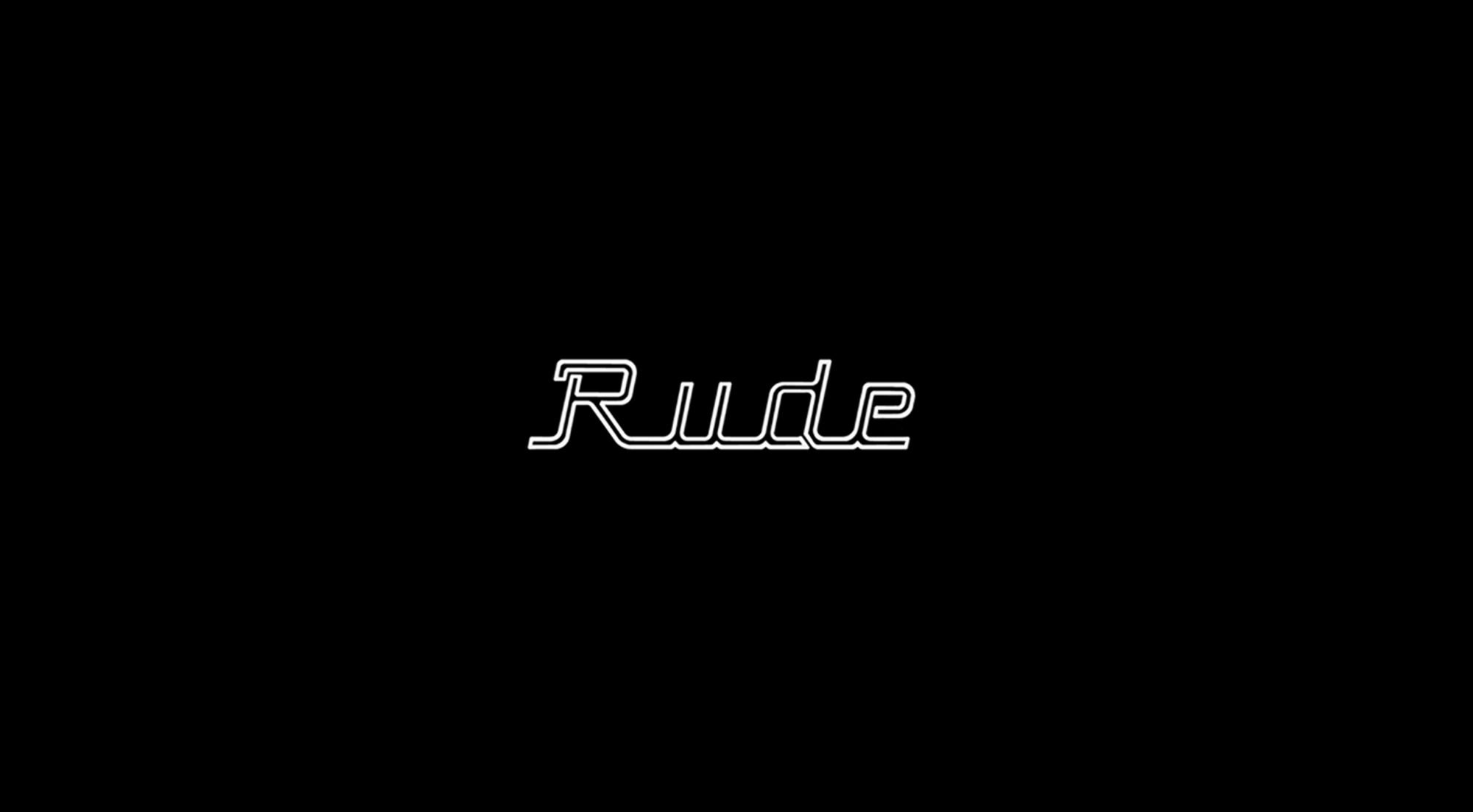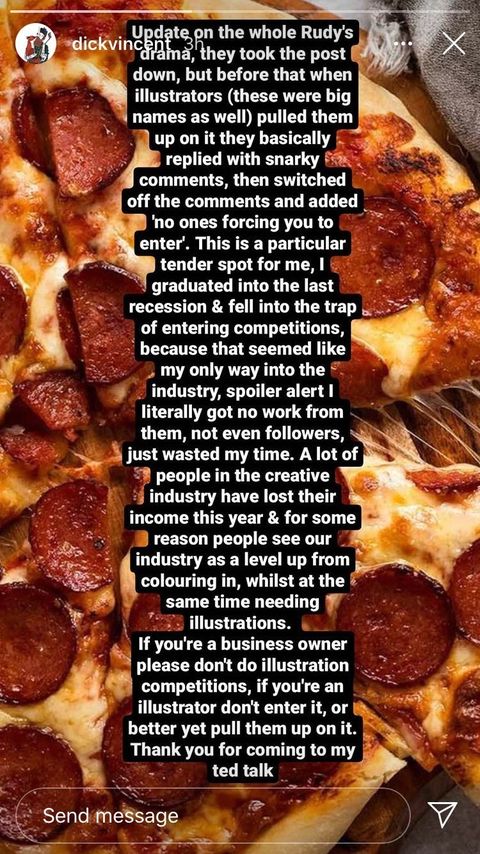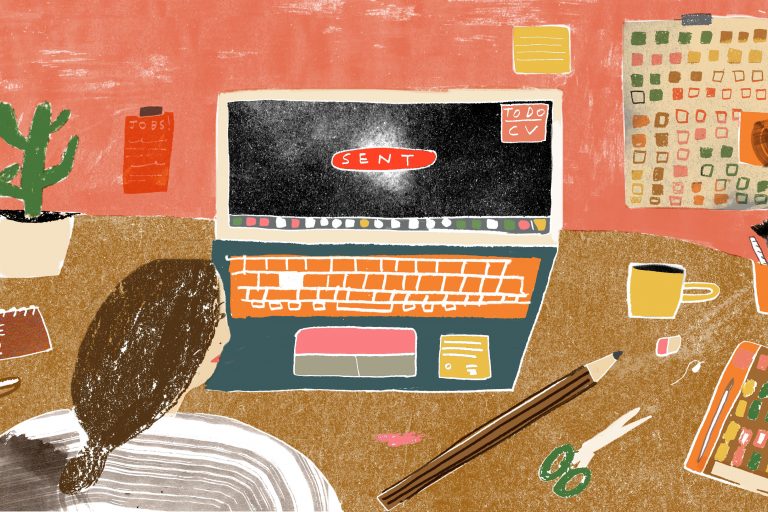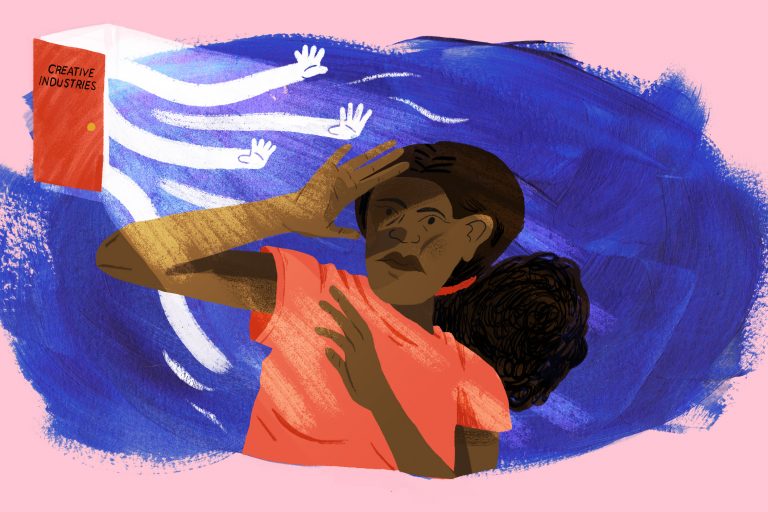
A Message To You Rudy’s
Free pitching is a system that fundamentally undermines the value of creative work, but this week a restaurant couldn't resist a slice of the action
Words by Alec Dudson
Illustration by Amrit Randhawa
As a general rule, this is not a platform that discusses pizza, but earlier this week one of Manchester’s favoured Neopolitan haunts, Rudy’s succeeded in drawing furious responses from the creative community, by posting a “competition” for t-shirt designs on their Instagram account.
The post, which was finally deleted after a series of revisions, increasingly combative responses to comments, the alleged deletion of comments and the comments being disabled, spurred an impassioned debate about spec work and the damage it does to the creative industries.
Speculative work or spec work for short is defined by the excellent nospec.com as “any kind of creative work, either partial or completed, submitted by designers to prospective clients before designers secure both their work and equitable fees.” The definition continues “under these conditions, designers will often be asked to submit work in the guise of a contest or an entry exam on existing jobs as a ‘test’ of their skill.” This is precisely what Rudy’s did and what they seemed determined to argue wasn’t improper for quite sometime before backtracking and ultimately withdrawing the post.
“We’re looking for arty folk to collab with on a special edition Rudy’s t-shirt in time for Xmas” the caption began. Initially, in return, the winning artist would supposedly receive free pizza for a year. Some of you might be reading this and think that actually sounds like a solid deal, but let’s just take a minute to break it down.
Firstly, being paid in-kind (exchanging services or products supposedly of equal value) is a minefield and doesn’t really function beyond friends doing casual favours for one another or collaborating on something that they both or all have an even stake in. Secondly, free pizza for a year? In practice, how much free pizza would you realistically expect here? Probably not that you’d be able to claim one every day right? You should always be wary of these vague descriptions of compensation because they’re intentionally fuzzy. A Rudy’s pizza costs between £6.90 and £10.90. How many of them would represent a fair price for an illustration commission used to sell t-shirts? 50? 100? 200? Do you think you’d be able to claim that many from the restaurant? It seems pretty unlikely to me.
In-kind pay does creatives no favours as it intentionally blurs the lines around the value of their work. It’s one of the many reasons that creatives struggle with pricing their work effectively. Everywhere you turn, people are trying to underpay you, lower your price, yet interestingly they seem keen to see your work associated with their brand, on t-shirts, at events and beyond. There’s often a seemingly different story in the value that they see in the work (the money that it can generate them) and what they’re willing to pay (very little or often, nothing). That’s fundamentally wrong, but creative freelancers are often regarded as easy prey for brands who dangle the value that the “exposure” you’ll benefit from as somehow more important than pay. The last time I checked, you couldn’t pay your bills with exposure, nor — and I’m sure some have tried — can you pay your bills with pizza.
Secondly, I’m triggered by the use of the word “collab” in that opening statement. Inviting people to make work for free, so that you can then select your favourite, leaving all but one with zero compensation for their time and efforts is not collaboration, it’s exploitation. A quick note to also say that the casual use of “collab” rather than “collaboration” is a great example of a common ploy rolled out on Instagram to make you feel like a brand is cool and matey. These people are not your friends, but by engaging with you on social media, they’re looking to casualise the interaction. Less formality, lower fees, it’s a very deliberate strategy to secure your work for a lower rate.
When it comes spec work though, it’s not just restaurant marketing departments that you have to watch out for. 99 designs and sites like it perpetuate this dreadful culture, inviting you to “start a contest” as one of the key functions of their product. They confidently assure that “the larger the prize, the more entries you’ll have” and not only offer the user (I will not call these people clients) a money-back guarantee but 100% of the copyright of the design. It’s a system that reduces designers using the platform to a horrible, eternal fight over spec work that’s not even well paid on the off-chance that you “win” the occasional competition. Winning work via this route is a pyrrhic victory for any creative. The “wins” (sorry, I’ve just been sick in my mouth again) will never justify the losses, all those times you’ve created work and not been selected, along with the drain that will have on your confidence, motivation, mental and financial health. I would also urge you to avoid the similar fresh hell that is Fiverr which also plays a noteworthy role in categorically undermining the value of creative work.
Culturally, this is a big issue for the creative industries and one that isn’t by any means limited to young creatives. Sarah Boris — whose piece on this issue for Eye on Design is a must-read — recently shared on Twitter that another established designer was in the process of winning one of her long-term clients by offering to work for them pro-bono. It’s a sad state of affairs when you not only have to watch out for the Rudy’s of this world but also your peers.
To any studio out there going about proposing your services pro bono at a time where everyone is struggling please note that not only you are undercutting other designers but that you are also undermining the design industry. #probono #studioculture #graphicdesign
— Sarah Boris (@sarahboris_LDN) November 5, 2020
Sadly, a typical contempt for the value of creatives was played out in detail throughout the lifespan of the Rudy’s post. When the first critical comments arrived, little seemed to change. Once that critique broadened, the post caption was adjusted to say that the winner would be paid as well as receive free pizza. When people pointed out that the issue of spec work was still a problem, whoever was in charge of the account did not take the continuing disapproval well. Comments seemed to be deleted and were soon disabled. Regrettably, the account holder responded to a number of the comments in an increasingly tone-deaf manner. “No one is forced to enter. This was intended as some fun for those who may be short of work” one reply read. Why they would think that doing unpaid spec work during a period of unemployment would be ‘fun’ for a creative is frankly beyond me.
When the post was finally deleted on Wednesday, it seemed to be due to the negative press that it was attracting as opposed to any acknowledgement that it had been a bad idea. My hunch is that whoever deleted it or more likely was told to delete it, still can’t really understand why it was wrong.
A number of commenters were keen to point out that Mission Mars, who bought Rudy’s in 2017 were the recently the recipients of a £1m Arts Council grant. The money was not granted to Rudy’s allegedly, but other businesses under Mission Mars’ ownership. Nevertheless, a cursory glance at the company’s public accounts shows that pre-COVID, they were a cash-rich business, in growth as of late 2018. They were securing new investment, bank loans and opening new site. Their directors’ wage bill rose significantly and they were comfortable enough to pay out a £50k dividend to those directors.
Some responses from Rudy’s focussed on the fact that staff are currently furloughed and that the hospitality sector is on its knees due to the pandemic. That may well be the case, but this is a huge business with a multi-million-pound annual turnover. The argument that they can’t afford to pay for creative work simply doesn’t hold any water. Even if it did, there’s something really grim about the idea that a struggling business would feel justified in ripping off freelancers due to being in testing times. I would be tempted to think that the companies who take that attitude would rarely think twice about ripping off freelancers when they were raking it in.
I was hoping that someone from Rudy’s would offer their perspective on the post — even if it was a robotic corporate statement — but having reached out to them for comment, I’ve yet to hear a peep.
It feels important to address this subject right now as I fear that the recession will only see more companies behave like this and more freelance creatives feel reduced to taking part as work becomes scant. I would urge you to avoid these “opportunities” at all costs because they’re not opportunities at all, they’re harmful acts of opportunism. If you’re a student, recent graduate or new to the creative industries, please read more about spec work and unpaid pitching, this interview with Erik Spiekermann is a good start.
Seeing the creative community rally together to shame Rudy’s into submission gave me some hope that freelancers can be resilient to these attempts to undermine their craft, but call out culture will not save us. Social media does give us the power to stand up against and demand more of the brands and companies who look to win our affection and hard-earned money, but we have to be wary of the echo chamber and its limited perspective.
Ultimately, my reason for writing this piece is to challenge the perspective that unpaid work in this or any form in okay. It’s not. Creative work is incredibly valuable and it’s a tool that every business uses to make money. It advertises products and services, shapes our perception of brands and plays a major role in businesses like Rudy’s building a cult following. Don’t let someone’s attempt to undermine your craft, convince you to give away your work for free. Would Rudy’s be able to function as a business if everyone who ate in their restaurant was given all of their pizzas for free, but only paid for the one they liked best? Of course they wouldn’t, they’d probably consider it pretty rude if that’s what you asked.
One of the responses that summed up the whole scenario quite brilliantly was Amrit Randhawa’s ‘Rude’ illustration, an adaptation of the Rudy’s logo. We liked it so much that we led this piece with it and guess what folks, we paid Amrit for that work. It’s really not hard to respect and value creativity, so please, get it right the first time and if you ask for spec work, don’t be surprised when you get schooled in the comments and dragged on social media. A big thanks to everyone who helped us to report on this story by sending in screenshots and information. Thank you for fighting this fight and bringing it to our attention, we hope that we’ve accurately represented your frustrations and your voice on this.












